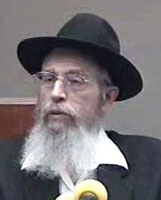- Torah Portion and Tanach
- Metzora
The Torah study is dedicatedin the memory of
Asher Ben Haim
149
The Rabbis applied the concept of lashon hara not only to speaking evil of other people, but also to speaking evil about the Land of Israel - in particular to the spies who tried to dissuade the Israelites from entering the Land by saying that it was 'a land that devours its inhabitants.' The Rabbis explain that the reason that the story of the spies follows immediately upon the story of Miriam and her tzara'at is that just as Miriam spoke lashon hara about her brother, so the spies spoke lashon hara about the Land of Israel. We see then that we should not say bad things about the Land of Israel, especially if such talk will dissuade people from coming to the Land.
It is easy to fall into the habit of complaining about Israel. We must make all efforts to refrain from voicing negative comments. We should do what the rabbis of the Talmud did (see end of massekhet Ketubot) - try to improve conditions in Israel so as not to give people any reason to complain.
--------------------------
This is a weekly column contributed by Aloh Naaleh an organization devoted to motivating Jews to make Aliya.
Aloh Na'aleh
POB 4337, Jerusalem 91042
Tel: 972-2-566-1181 ext. 320 ~ Fax: 972-2-566-1186
Email: aloh-naaleh@aaci.org.il

“Ba’omer” or “La’omer”?
Rabbi Daniel Mann | Iyar 4 5777

The Seudah of a Bris
Rabbi Yirmiyohu Kaganoff | Cheshvan 9 5781

Use of a Rickshaw on Shabbat
Rabbi Daniel Mann | 5773

Is papaya a tree?
Rabbi Yirmiyohu Kaganoff | Shvat 2 5779

P'ninat Mishpat: Rental of an Apartment that Was Not Quite Ready – part II
based on ruling 82031 of the Eretz Hemdah-Gazit Rabbinical Courts
Beit Din Eretz Hemda - Gazit | Iyar 5784

Ask the Rabbi: Scratching Improperly Parked Cars
Rabbi Daniel Mann | Iyar 5785
Daf Yomi Makkot Daf 24
R' Eli Stefansky | 4 Iyar 5785






